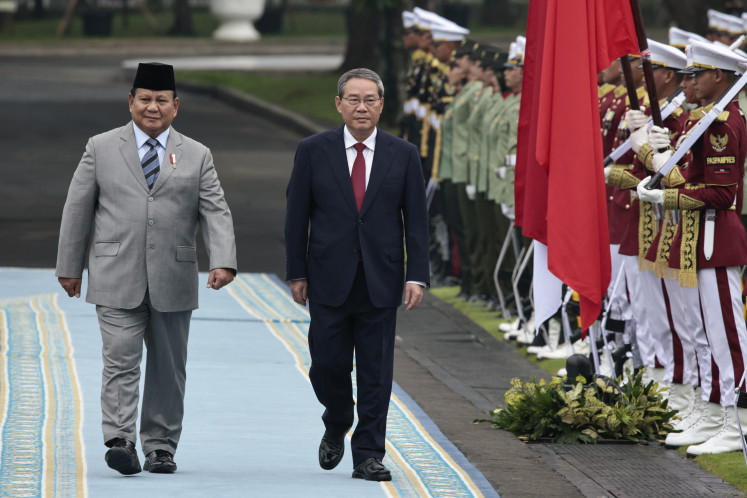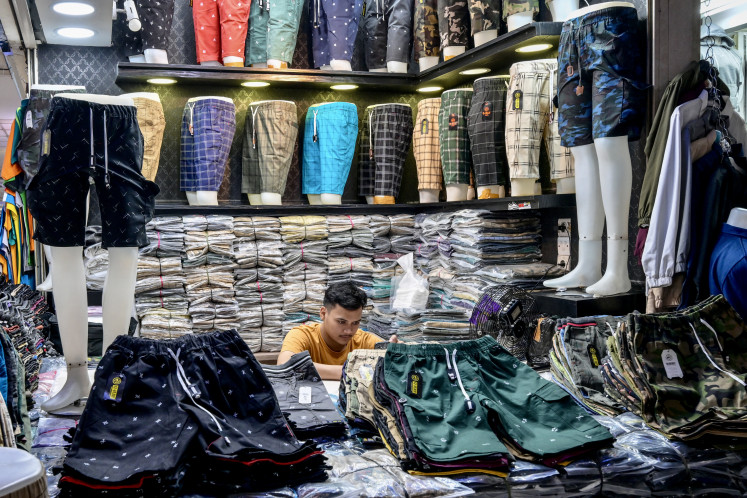New rules on food reserves may undercut Bapanas
Change text size
Gift Premium Articles
to Anyone

T
he government has just added two commodities to the list of staple food commodities and assigned additional roles to the State Logistics Agency (Bulog) to help stabilize domestic supplies, but experts warn that challenges in dealing with the food reserves supply chain would remain.
Presidential Regulation No.125/2022 on government food reserves stipulates, among other things, adding two items -- fish and cooking oil -- to the nine staple-food commodities list set in Presidential Regulation No. 66/2021 on National Food Agency (Bapanas).
Meanwhile, Bulog and/or the state-owned staple food holding company will be responsible to distribute corn and soybeans when the market price exceeds the retail price ceiling (HET).
Ali Usman, chairman of the Center for Agricultural Food Studies and Advocacy (Pataka), told The Jakarta Post that Bapanas would need to immediately design technical rules to regulate procurement, management and distribution, saying that the agency must have adequate data analysis to determine the exact amount of staple food for each phase in supply chain movement, in order to reach the captive market.
“[Bapanas] needs to ensure the food reserve supply chain does not disrupt private as well as small and medium businesses,” Ali said on Monday.
He went on to say that, while managing rice reserves was relatively easy, corn and soybeans would present a new challenge for Bapanas considering inadequate supply and demand data on both commodities.
Mokhamad Suyamto, Bulog’s director of supply chain and public services, said in a statement issued on Oct. 28 that the new regulation needs derivative measures to serve as the operational basis for Bulog.
Presidential Regulation No. 66/2021, which came into effect on July 29, established the Bapanas to coordinate, formulate and implement policies related to food availability, prices, security, nutrition, diversification and safety. Bapanas reports directly to the President.
The regulation limits the Bapanas’s authority to nine staple foods: rice, corn, soybeans, sugar, onions and shallots, eggs, poultry meat, bovine meat and chilies.
In executing its mandate, Bapanas assumes certain powers from the State-Owned Enterprises (SOEs) Ministry, Trade Ministry and Agriculture Ministry and will replace the latter ministry’s Food Security Agency (BKP), which has been disbanded.
Muhammad Saifulloh, assistant to the deputy for food and agriculture at the Coordinating Economic Ministry, said that the ministry will intensively work with Bapanas to follow up on the derivative regulation of Presidential Regulation No.125/2022, which was established on Oct. 24.
“We will begin working on the implementation [of the new rule] as soon as possible,” he told reporters in Jakarta on Oct. 28.
Weakening Bapanas authority
Bhima Yudhistira, executive director of the Center of Economic and Law Studies (CELIOS), said that Article 4 Verse 2 of the new regulation -- which specifies the amount of government food reserves to be determined through an agency head and or ministerial-level meeting -- would potentially weaken Bapanas authority.
“Bapanas should have the authority to decide the amount of government food reserves, considering the results of the rakortas [limited coordination meeting],” he told the Post on Monday. “The possibility of the rakortas facing deadlock due to different [priorities] across ministries may delay the government food reserves-determination process.”
Bhima suggested the government strengthen upstream food-reserves capacity while simultaneously fostering productive research for agriculture technology development and greater fertilizer subsidy and increasing the efficiency of the staple-food supply chain.
Establishing the Bapanas is one of the Joko “Jokowi” Widodo administration’s strategies to improve food security in Indonesia, which includes developing food estates and establishing a state-owned staple food-holding company.
Indonesia, the world’s fourth-most-populous country, went up six ranks in the Global Food Security Index (GFSI) from 69th in 2021 to 63rd this year, the third lowest among the six major ASEAN economies after the Philippines and Thailand, mainly due to underlying gaps in the country's ability to create a food-secure environment.
“Indonesia needs to focus on [...] enhancing political commitment to better prepare for and adjust to the projected risks associated with climate change,” the 2022 GFSI report reads.









